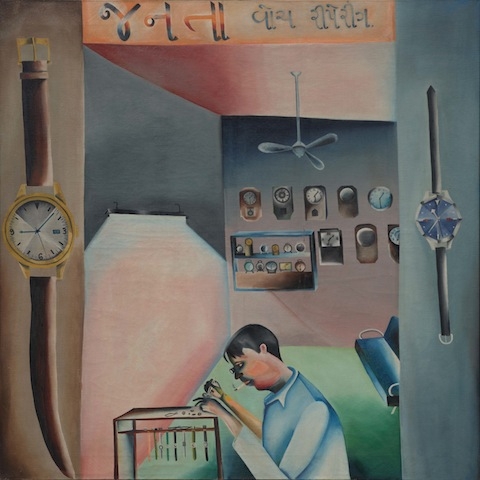1 June – 6 November, Tate Modern, London
Like many of his paintings, Bhupen Khakhar’s Barber Shop (1973) features a central male figure looking out impassively at the viewer. The barber stands over his customer, who we see in profile looking towards a mirror at the righthand side of the picture. Yet the reflection in the mirror, as in Manet’s A Bar at the Folies-Bergère (1882), offers a skewed reflection at the wrong angle, and forms a second disembodied face looking back at the viewer, a ghostly echo of the barber.
Awkwardness; isolated, downbeat figures; disjointed, flattened pictorial space and a certain hallucinatory quality are all typical attributes of the idiosyncratic oeuvre of Khakhar. He emerged during the late 1960s as part of a generation of Indian painters who went to art school in Baroda and who rejected the prevailing trend to paint in the manner of the School of Paris (most notably seen in the Progressive Artists Group). Khakhar did not look to Paris or New York as the preceding generation had done and instead focused on Indian everyday life, particularly in what he called his ‘trade paintings’ from the early 1970s (such as Barber Shop). You Can’t Please All, this large survey of his work at Tate Modern, has a strong selection of these in its second room, each filled with its own visual curiosities. Janata Watch Repairing (1972) shows a watch repairer diligently at work. A row of clocks on the back wall all put the time roughly at half past one, but framing the picture, and painted out of scale, are two watches with totally different times. From their position and size, they could be depictions of watches painted on the walls of the watchmaker’s shop. Or they might simply indicate something hinted at with the mirror in Barber Shop – the presence of overlapping realities.
During the early 1970s Khakhar still tried to hide his homosexuality, although fellow artists were aware. Later on in the decade Khakhar was more open about his sexuality, and his paintings move on to expressing it. Yet there is no joyous release in his works that accompany this increased openness. You Can’t Please All (1981), seen as the artist’s public statement on his sexuality, depicts a naked man on a balcony watching a scene unfold beneath him that references Aesop’s fable of a man and a boy taking a donkey to market, and in their attempt to satisfy the comments of passersby, inadvertently drowning the unfortunate animal. The work is rather mysterious and restrained, the central figure, like so many of Khakhar’s figures before he came out, isolated. Later paintings, after Khakhar suffers from cataracts, have looser handling, and works such as In the Coconut Groves (1983), In a Boat (1984) and Party (1988) display a more active sense of purpose. The men in Khakhar’s paintings finally stop looking so isolated and start looking like they are having some serious fun.
In truth the two rooms of the exhibition at Tate Modern that focus on the trade paintings and the works from the 1980s would have made a strong, coherent exhibition. However, a desire to pack as much as possible into six rooms, some intensely painted exhibition walls for backdrop and the presence of vitrines containing written texts by Khakhar combine to give this particular exhibition a physical claustrophobia that does not help with unravelling this most conceptually claustrophobic of painters. A decent effort by Tate Modern in its ongoing attempt to be more international, but one suspects Khakhar would have only given the curatorial team a B+ for their efforts.
Bhupen Khakhar: You Can’t Please All is on view at the Deutsche Bank Kunsthalle, Berlin, through 5 March 2017.
This article first appeared in the Autumn 2016 issue of ArtReview Asia.
